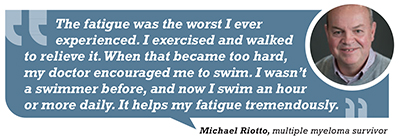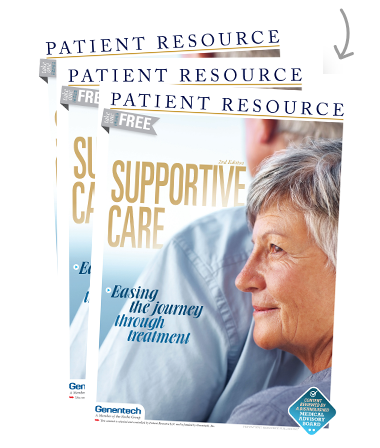Fatigue
Cancer-related fatigue is an ongoing lack of energy and sense of exhaustion. It is a much more intense feeling than the tired feeling felt by healthy people, and it isn’t relieved by sleep. It is one of the most common and most challenging side effects for many people.
Although the exact cause isn’t known, theories suggest that it could result from healthy cells and tissues becoming inflamed or damaged by cancer and its treatments or that your body is working extra hard to repair that damage. Additionally, it appears that fatigue is often worse in people who have a combination of treatments, have advanced cancer or are elderly.
What causes fatigue?
This common side effect can be caused by many cancer treatments, including chemotherapy, targeted therapy, immunotherapy, radiation therapy, bone marrow/stem cell transplantation and surgery. Conditions such as anemia, pain and mental stress can also cause or worsen fatigue.
When does fatigue typically occur?
Fatigue that is due to cancer and its treatment can last for weeks, months or years and depends on the type of treatment and how much treatment is received.
For people who have surgery for cancer with no other treatment, fatigue is likely to last for a few days to a few weeks after surgery. It is commonly caused by side effects from general anesthesia, as well as your body recovering from having had an operation.
For patients receiving chemotherapy, targeted therapy or immunotherapy in cycles, fatigue often gets worse at first and may get better until the next treatment, when the pattern starts again. Once treatment is complete, the fatigue often lessens within a few months but may last up to a year.
Fatigue as a result of radiation therapy tends to worsen as the treatment goes on. It usually lessens within a few weeks to a few months after treatment is complete.
You can also expect fatigue from a bone marrow/stem cell transplant, which is typically accompanied by chemotherapy, to last for up to a year.
How you can manage fatigue
These suggestions may help.
- Exercise. Although many people think exercise will increase fatigue, the opposite is actually true. Regular exercise, such as walking or riding a bike, is the best way to help manage and reduce your fatigue. Taking short walks and getting light exercise several times a week can actually increase your energy level.
- Practice good sleep hygiene. Be consistent. Go to bed and get up at the same time each day, including on the weekends. Keep your bedroom quiet, dark and at a comfortable temperature. Do not look at electronic screens before bed. Avoid large meals, caffeine and alcohol before bedtime. Be physically active during the day because it can help you fall asleep more easily at night.
- Balance rest and activity. Do activities that are relaxing for you. Listen to music, read, meditate, practice guided imagery or spend time with people you enjoy.
- Plan time to rest. If you are tired, take short naps of less than 1 hour during the day. However, too much sleep during the day can make it difficult to sleep at night.
- Don’t overdo. Prioritize the activities that are most important to you and do them when you have the most energy. Ask for help with important tasks such as making meals or driving.
- Address cancer-related pain. Unrelieved pain may affect your activity level, appetite, ability to sleep and emotional well-being, all of which may add to your fatigue. Don’t be afraid to tell your health care provider or nurse that you have pain or ask for a referral to a pain or palliative care specialist.
- Seek relief from other symptoms. Practice strategies to relieve symptoms that may contribute to fatigue, such as nausea, vomiting and depression. If you need additional help, ask your health care provider for ways to manage them.
- Reduce stress. Consider meeting with a psychiatrist or therapist to learn how to manage stress. Supportive expressive therapies, such as support groups and journaling, may help.
- Eat and drink well. Meet with a registered dietitian to learn about foods and drinks that can increase your energy level, such as foods high in protein and calories. Some people find it easier to eat many small meals throughout the day instead of three big meals. Stay well hydrated. Limit your intake of caffeine and alcohol.
- Coordinate with your work schedule. If you plan to work during treatment, talk to your supervisor or your Human Resources department about the potential for fatigue on the job and ways you can manage it, such as taking time off or scheduling important tasks for times when fatigue may be at its lowest.
- Ask for a referral to a cancer rehabilitation facility. Before treatment, if possible, ask your medical team whether you have access to a rehab facility that offers proven techniques for reducing fatigue.

When to call your health care provider
Tell your health care team if fatigue is preventing you from being able to carry out your normal activities or if you are very tired even after resting or sleeping. Keep track of your energy levels throughout the day to help them assess your fatigue. Write down how it affects your daily activities and what, if anything, makes the fatigue better or worse. Download a free side effects tracker at PatientResource.com/Tracker.
Call immediately if you have the sudden onset of any of the following symptoms:
- Confusion
- Dizziness or loss of balance
- Extreme tiredness that forces you to stay in bed for more than 24 hours
- Fatigue that has gotten worse or a sudden decrease in energy level
- Feelings of being out of breath or of a racing heart after mild activity



